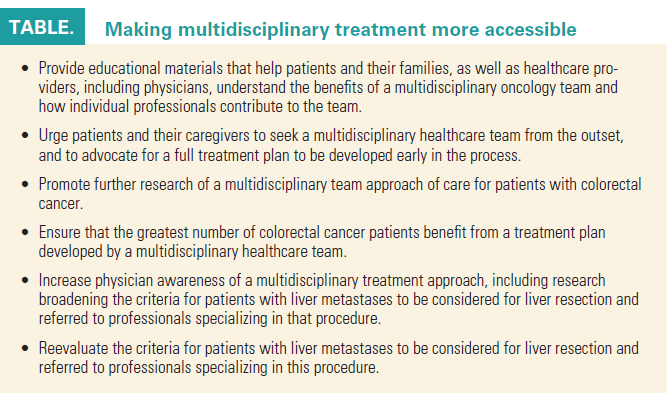Consortium advances multidisciplinary program for colon cancer
Colorectal cancer is the second leading cause of cancer-related deaths in the United States. According to the most recent data from NCI, the relative five-year survival rate among metastatic colorectal cancer patients is 8%. While colorectal cancer can metastasize to other organs, including the lung, the liver is the most frequent site of metastasis. Metastases to the liver occur in approximately 50% of colorectal cancer patients and account for at least two-thirds of all colorectal cancer deaths.
ABSTRACT: Statement of support by eight colon cancer advocacy groups calls for more research, reevaluation of criteria for liver resection.
Colorectal cancer is the second leading cause of cancer-related deaths in the United States. According to the most recent data from NCI, the relative five-year survival rate among metastatic colorectal cancer patients is 8%. While colorectal cancer can metastasize to other organs, including the lung, the liver is the most frequent site of metastasis. Metastases to the liver occur in approximately 50% of colorectal cancer patients and account for at least two-thirds of all colorectal cancer deaths.
Research at leading cancer care institutions has shown that a multidisciplinary approach to treating metastatic colorectal cancer results in the best outcomes. A team of medical specialists would consist of: a liver surgeon, a medical oncologist, a radiation oncologist, a gastroenterologist, an oncology nurse, and an oncology social worker. This group would work as one integrated team to offer the best treatment options and care for patients. By combining several types of treatment, these care providers are making it possible for more patients with liver metastases to undergo resection.

While in many large institutions a multidisciplinary team approach is standard practice in treating colorectal cancer, in other settings patients may need to take an active role in enlisting their own team of specialists.
As representatives of oncology patient advocacy organizations, we are committed to furthering a multidisciplinary treatment approach to colorectal cancer. To help make multidisciplinary treatment more accessible, we support the efforts highlighted in the table below. We trust that the commitment of this group of professionals and lay people dedicated to oncology will amplify the potential for advancing multidisciplinary treatment.